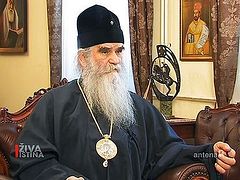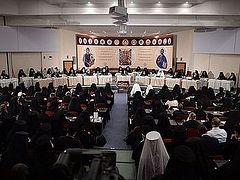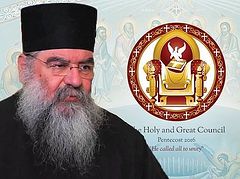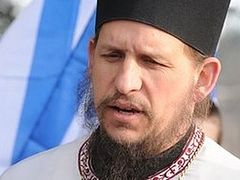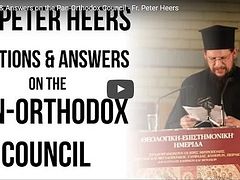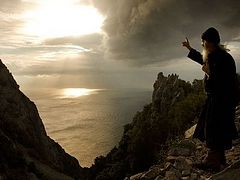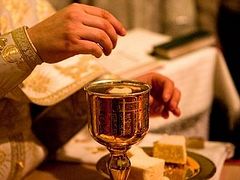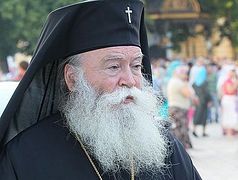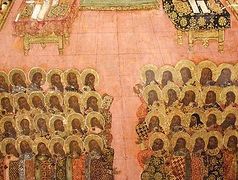Source: TASS
Moscow, November 22, 2016.
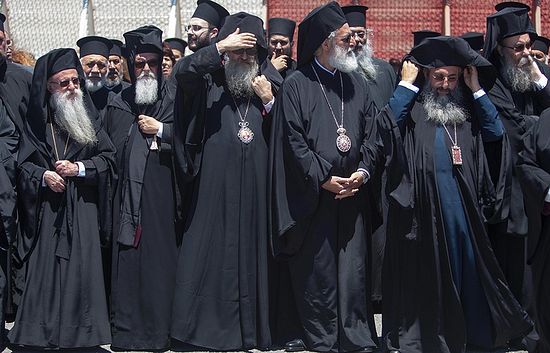 Senior Orthodox clergy at the airport of Chania in the Greek island of Crete © Holy and Great Council via AP
Senior Orthodox clergy at the airport of Chania in the Greek island of Crete © Holy and Great Council via AP
The Russian Orthodox Church made a last-minute decision to stay away from the Holy and Great Council of the Orthodox Church, which took place on Crete, Greece, in July 2016 in a bid to avert a split, Patriarch of Moscow and All Russia Kirill told journalists ahead of his 70th birthday.
"Divisions followed almost every Council in history. They took place even after Ecumenical Councils. Therefore, nowadays we had to avert the risks of creating a new split. That is precisely why we agreed to adopting all the decisions by consensus. However, as it turned out at a meeting of the Church primates in Geneva, two Churches - the Church of Antioch and the Georgian Orthodox Church -broke the consensus by refusing to sign very important documents," Patriarch Kirill explained.
"Then the Serbian Orthodox Church said that it was necessary to postpone the Council. The Bulgarian Church refused to attend the gathering. The Church of Antioch and the Georgian Church followed suit. When we received all that information, we sent a letter to Constantinople suggesting that an urgent pan-Orthodox conference be convened to discuss our future steps and decide on what we are supposed to do because it was impossible to assemble the Council without consensus," the head of the Russian Orthodox Church went on to say.
A fundamental principle, which the primates of the local Orthodox Churches adopted at the pan-Orthodox Council, was that all the documents should be approved by consensus with an aim to avoid differences and divisions. "We stated once again that the documents which were supposed to be presented to the Council (on Crete) did not suit us in their present form and that we had serious amendments to those documents. We received a very impolite reply, which said that the Council would take place anyway," Patriarch Kirill went on to say.
"If the Council takes place in the absence of the necessary consensus, it means that we are giving up the common principles, which all of us approved. Besides, it would mean that we are simply creating conditions for a split in Orthodox Christianity," the patriarch explained. He said that representatives of some Orthodox Churches had still travelled to Crete to attend the Council while others had refused: that automatically deprived that Council of its pan-Orthodox status. It was under those circumstances that our (Russian) Orthodox Church decided to stay away from the Council," the Patriarch of Moscow and All Russia stressed.
Further action
"But we honor the event that took place on Crete. We certainly have our own reservations and amendments. Our Biblical-Theological Commission has certainly studied the documents adopted by the Crete Council and has prepared amendments to them," Patriarch Kirill elaborated. According to him, the next Primates’ Council will study them in detail in order to be able to make its own proposals.
"We consider the Crete Council to be part of the process. Today, in the absence of a whole number of churches, we should avoid dramatizing the whole thing. We are on the way to a (pan-Orthodox) Council, which is going to be convened according to all the rules and in due form and which will present commonly agreed on Orthodox documents to the world," Patriarch Kirill concluded.
The Holy and Great Council of Orthodox Churches took place on the island of Crete, in Greece, on June 20-26, 2016. It had been prepared, with pauses and intervals, as a pan-Orthodox Council for 55 years. However, 4 out 14 Local Orthodox Churches - the Bulgarian Church, the Church of Antioch (Syria); as well as the Georgian and the Russian Orthodox Churches - did not attend the Council’s meeting because of a disagreement with the procedure and the texts of the adopted documents.
Asked to comment on the activities of the Russian Orthodox Church in Russia, Patriarch Kirill said that over 5,000 new churches had been completed throughout Russia since he took the helm at the Russian Orthodox Church seven years ago. The number of clergymen has also risen by 10,000 under his patriarchy.
"If we take the period from 2009 to January 2016, our Church saw 5,000 new churches built and 122 newly-constructed monasteries; the number of clergymen increased by 10,000," Patriarch Kirill told journalists.
He explained that 160 new parishes had appeared in Moscow due to its expansion a few years ago. The number of parishes and bishops almost doubled from 159 to 296 and from 200 to 361, respectively.
He noted that the Russian Orthodox Church had taken the work, which it was carrying out in Russian regions, to a fundamentally new level. "The fact that today we can see the invigoration of the entire church life is certainly linked, in the first place, to the creation of new eparchies and a new vertical of power in the Russian Orthodox Church," the patriarch went on to say.
One of the most obvious advantages, which this system has, is that "today the patriarch can learn more about what happens in churches not just for statistical but also for analytical purposes - we can see what happens from year to year and how changes work in any sphere," Patriarch Kirill stressed.
"We can make adjustments to this work, what we actually do through the Supreme Church Council and the Synod of the Russian Orthodox Church. Perhaps, now we can give our first assessments to what we do. It seems to me that much has certainly changed even in statistical terms," Patriarch Kirill said.
He added that the changed attitude to Church in Russian society, was the main indicator of change inside the Russian Orthodox Church in his view.

